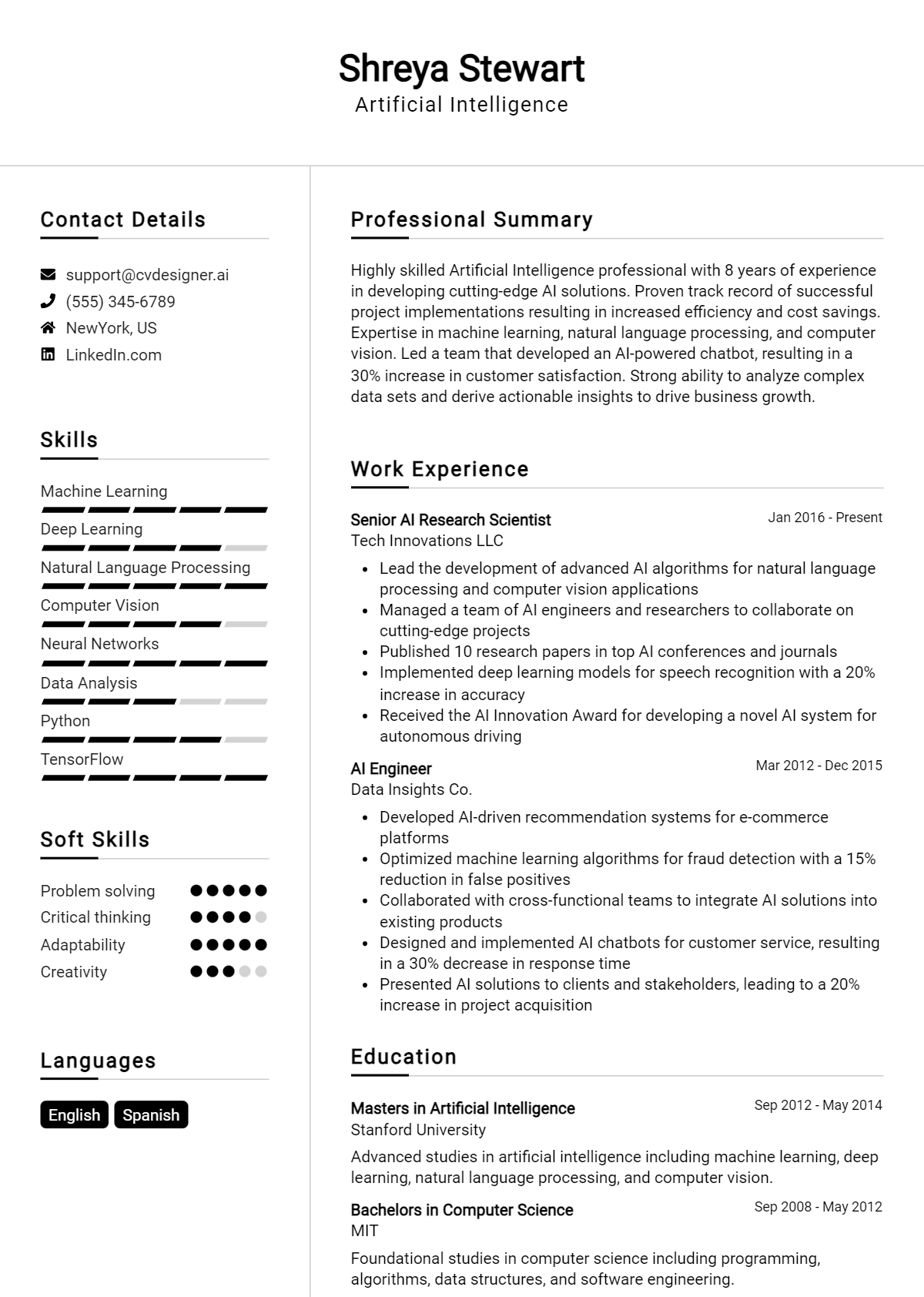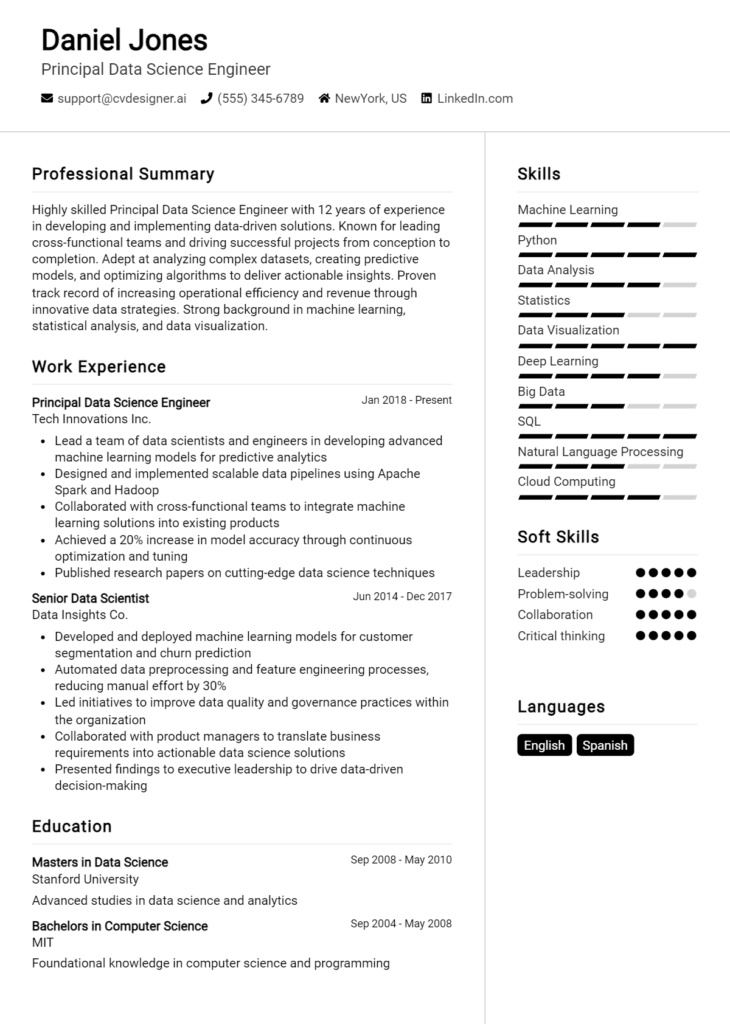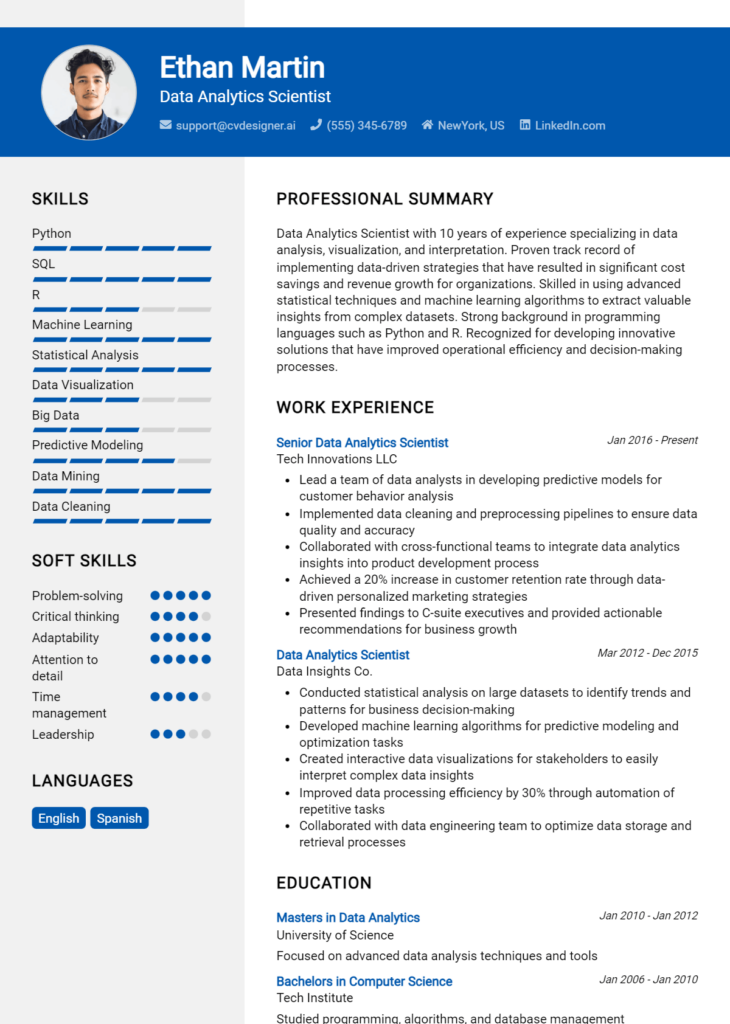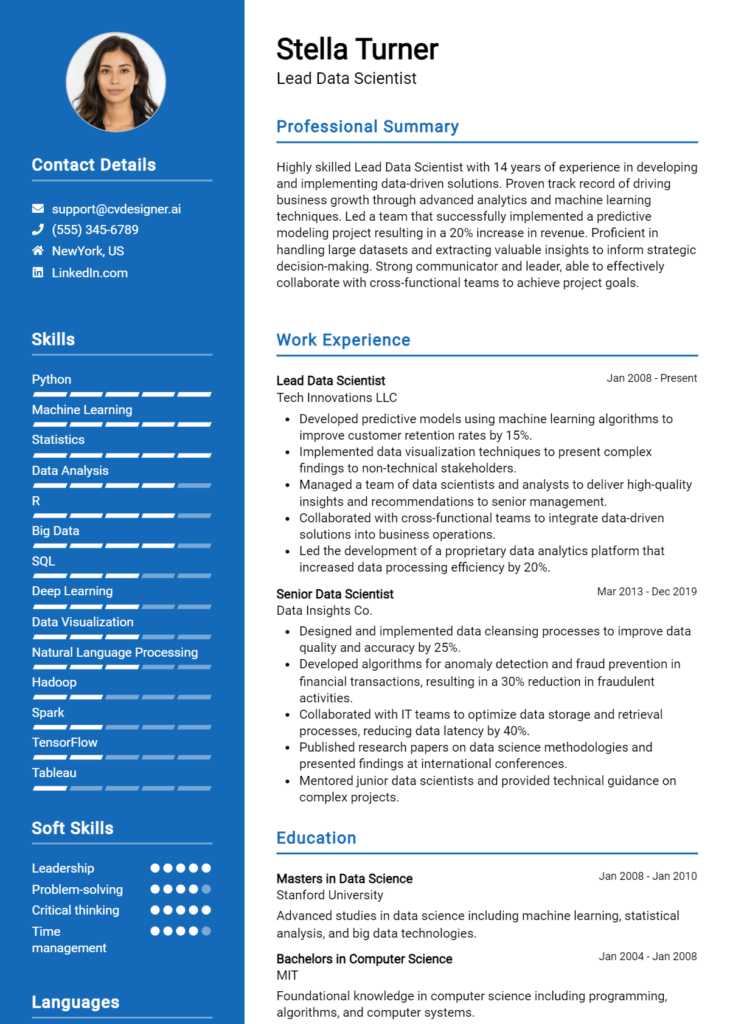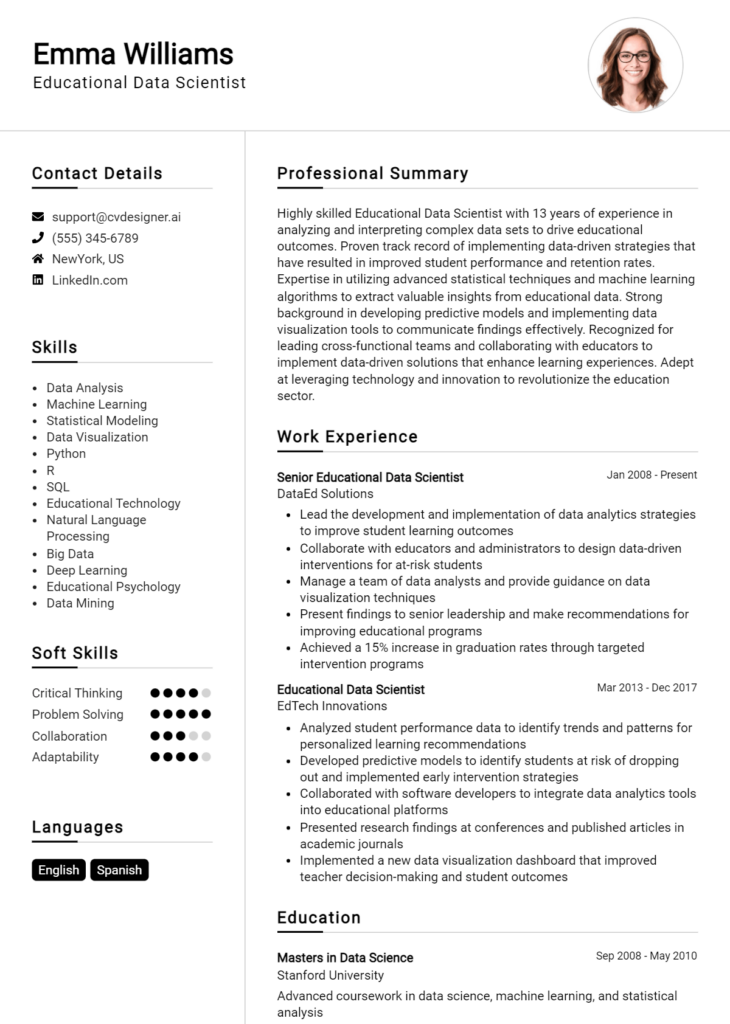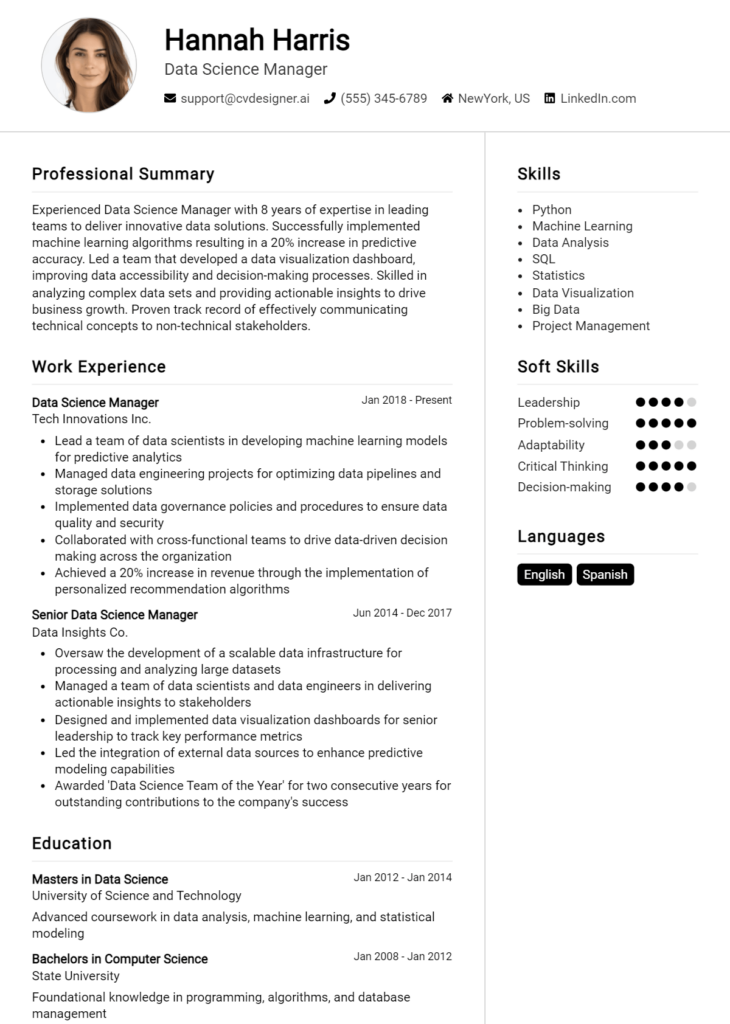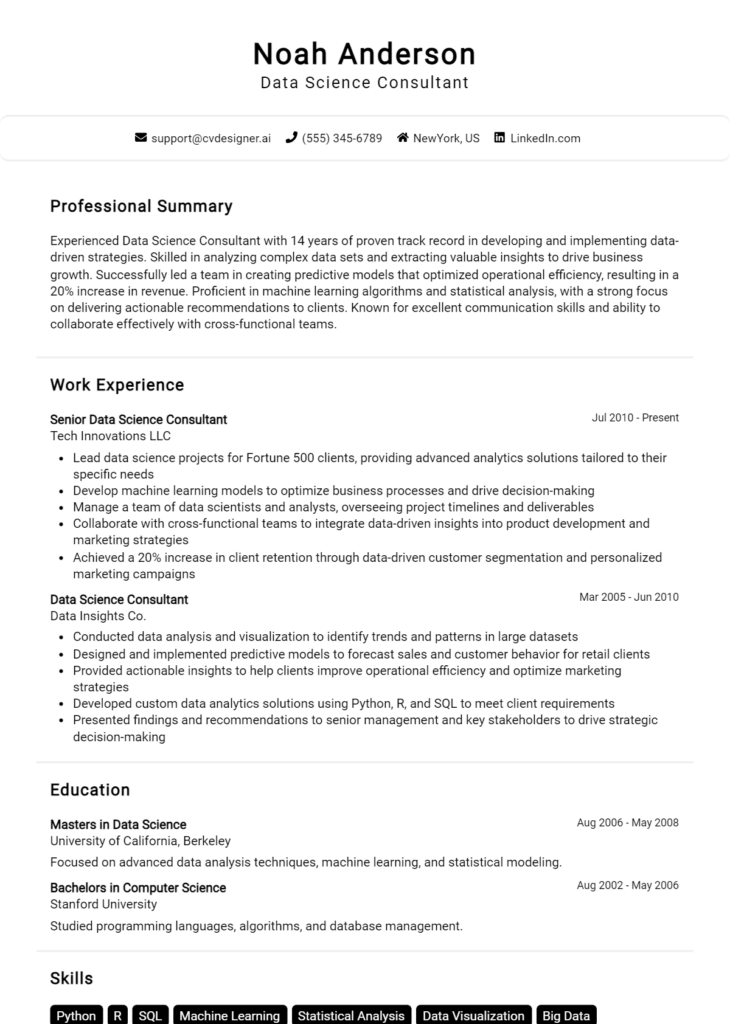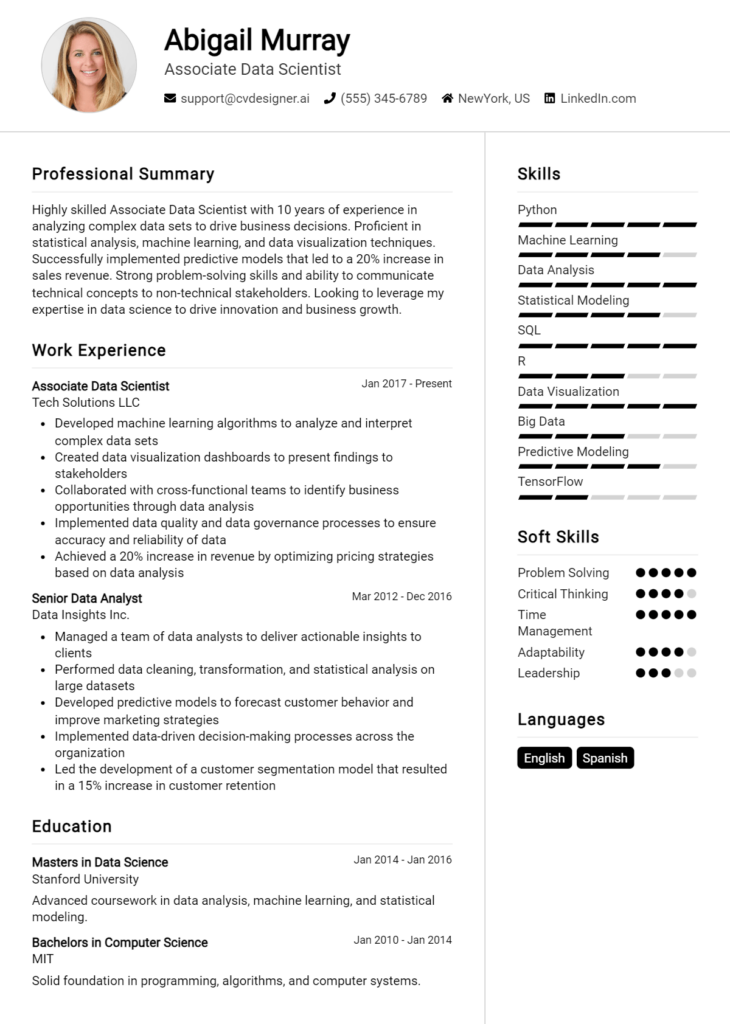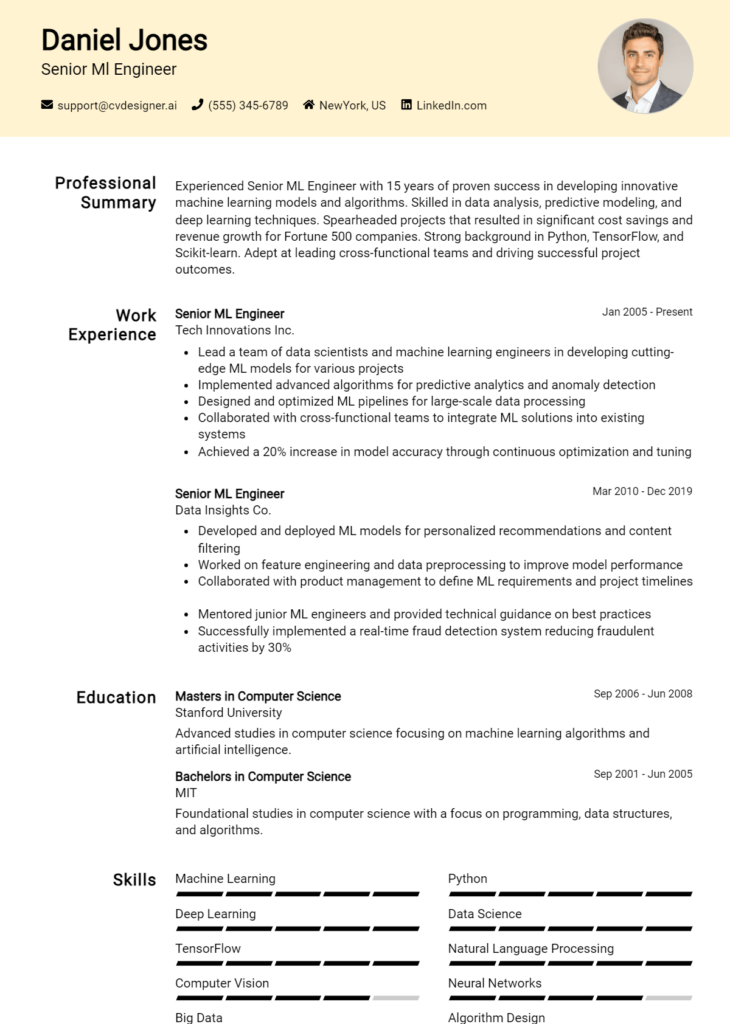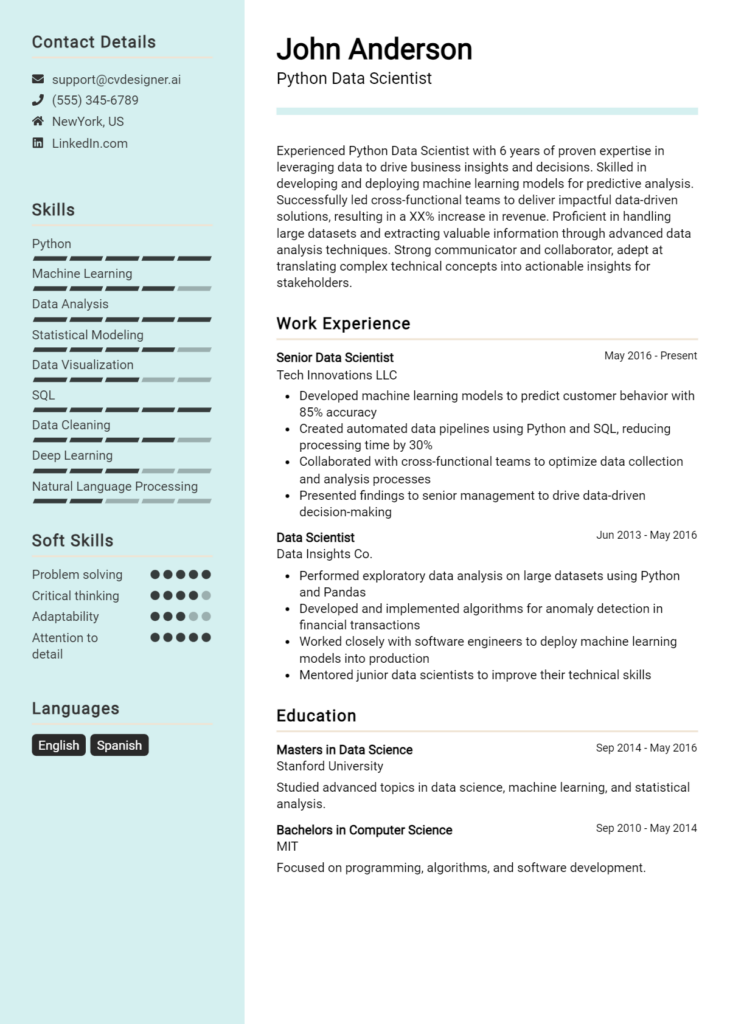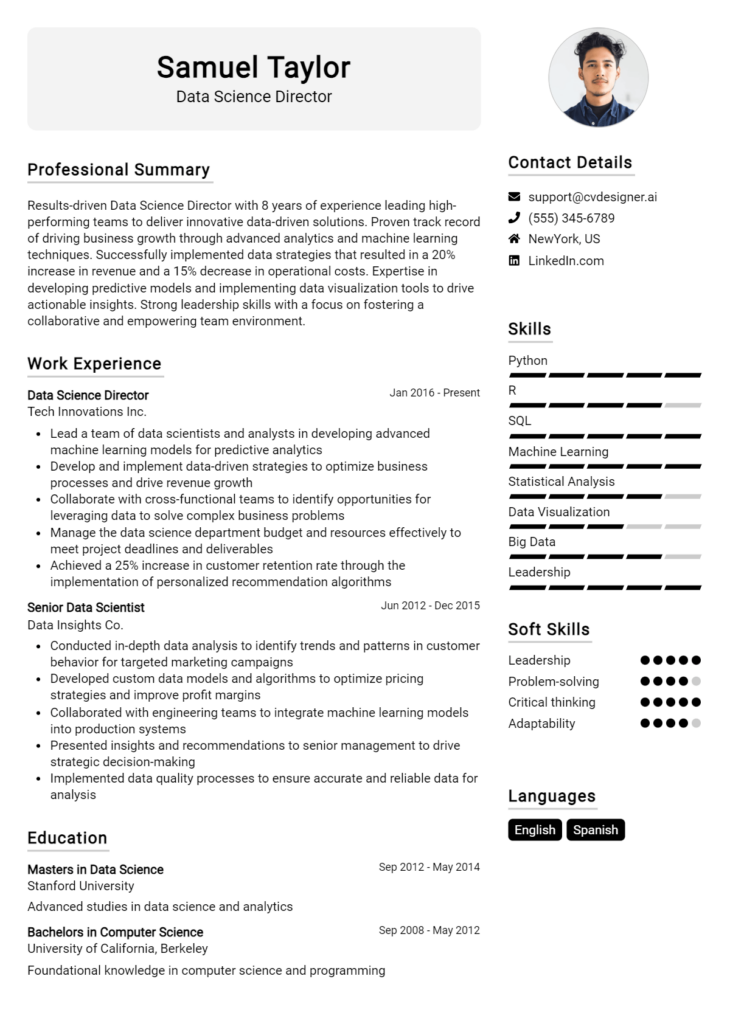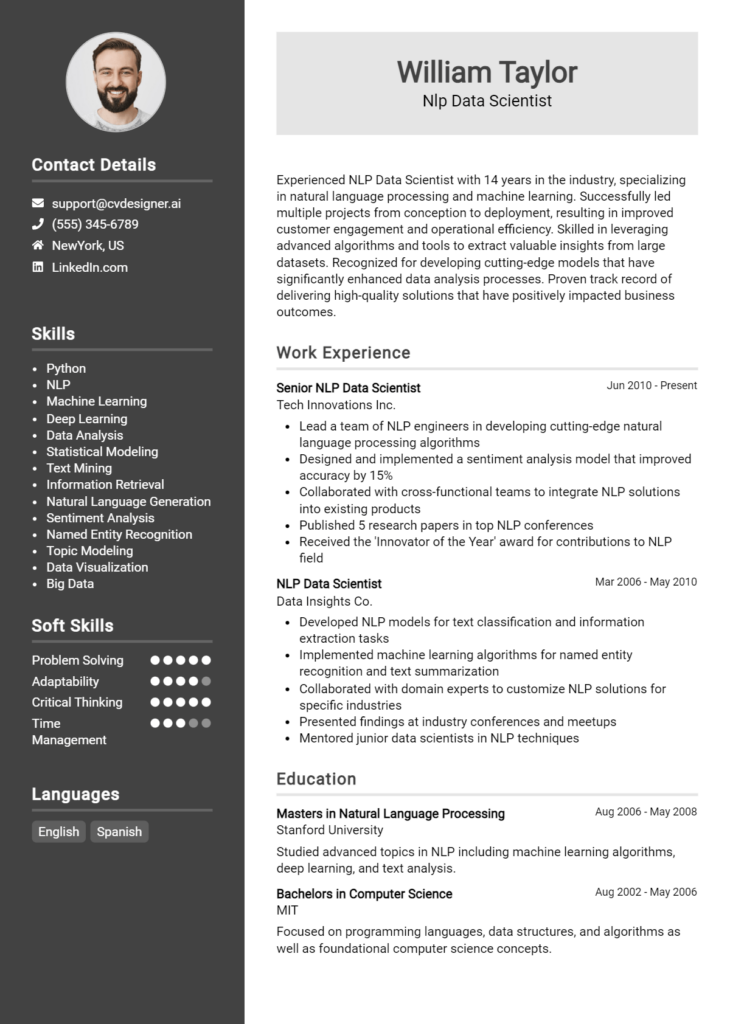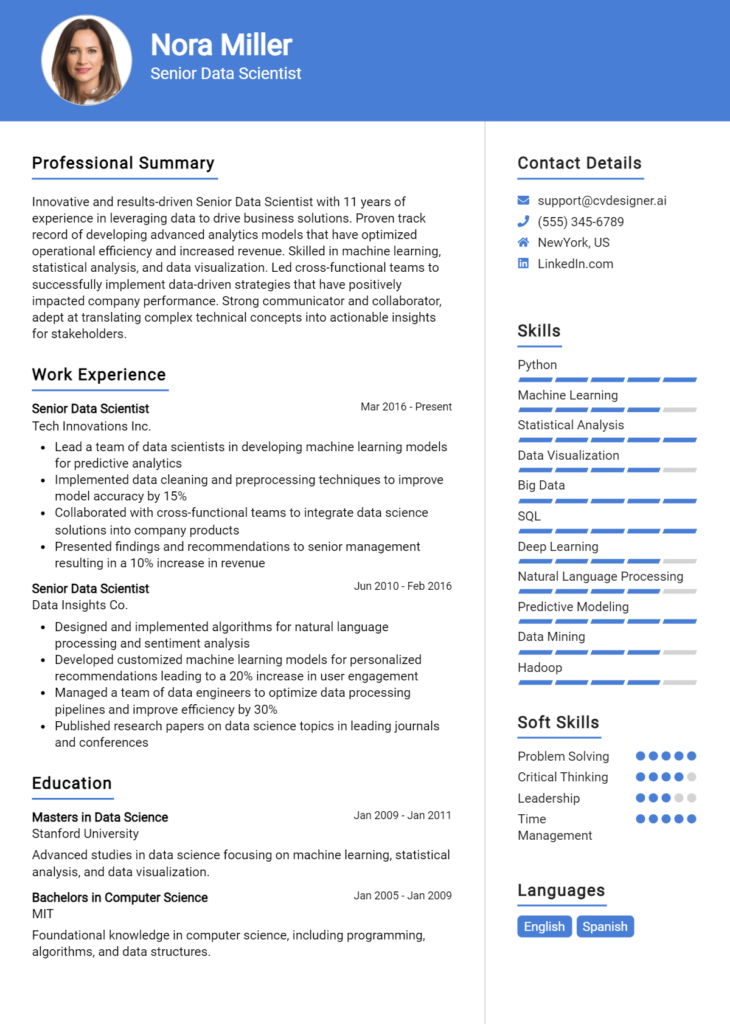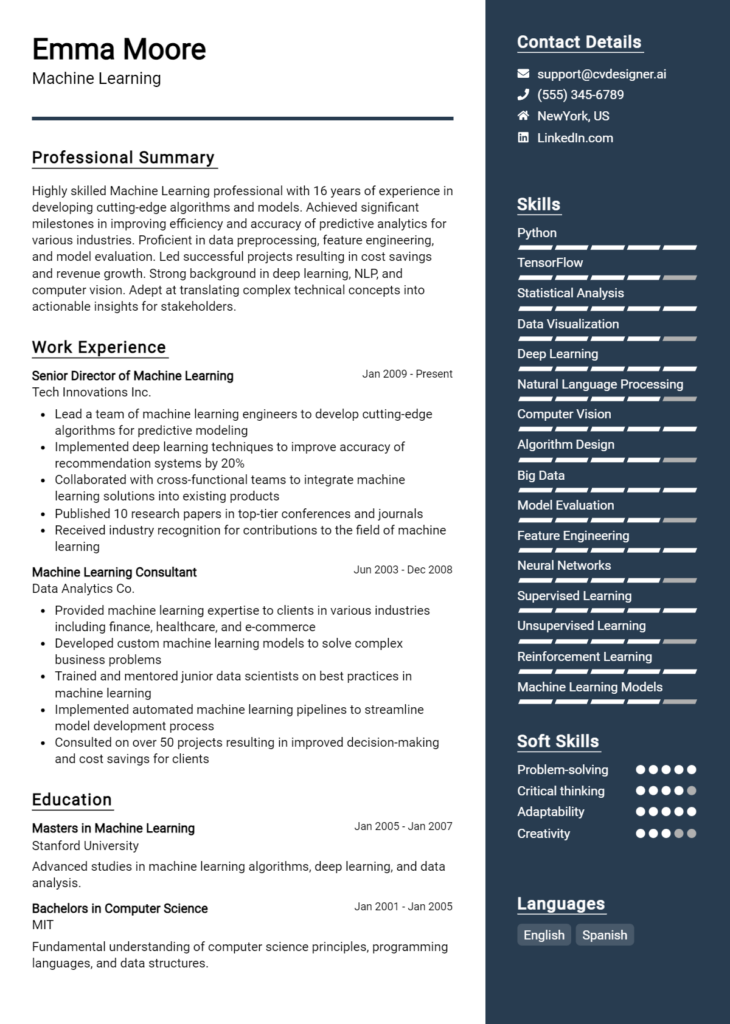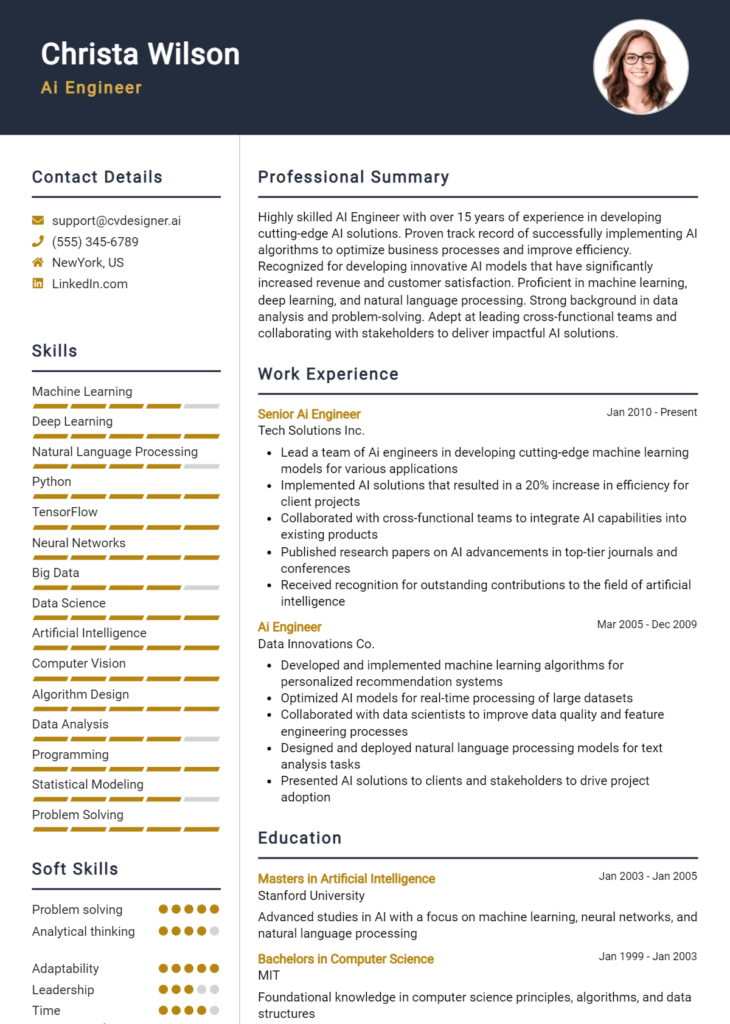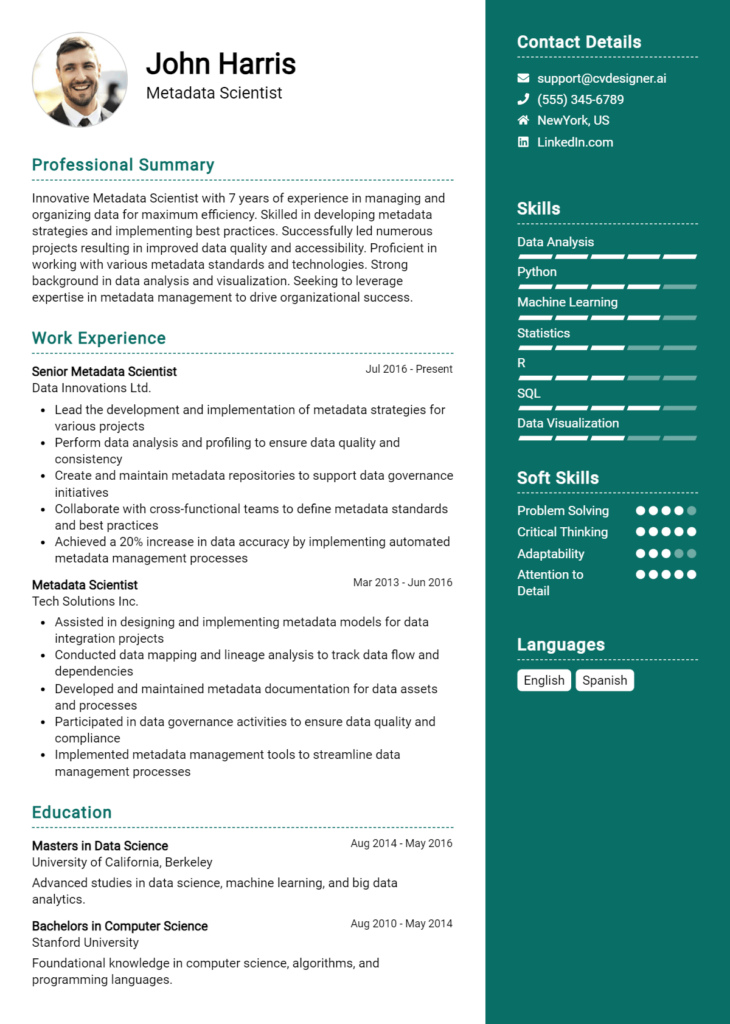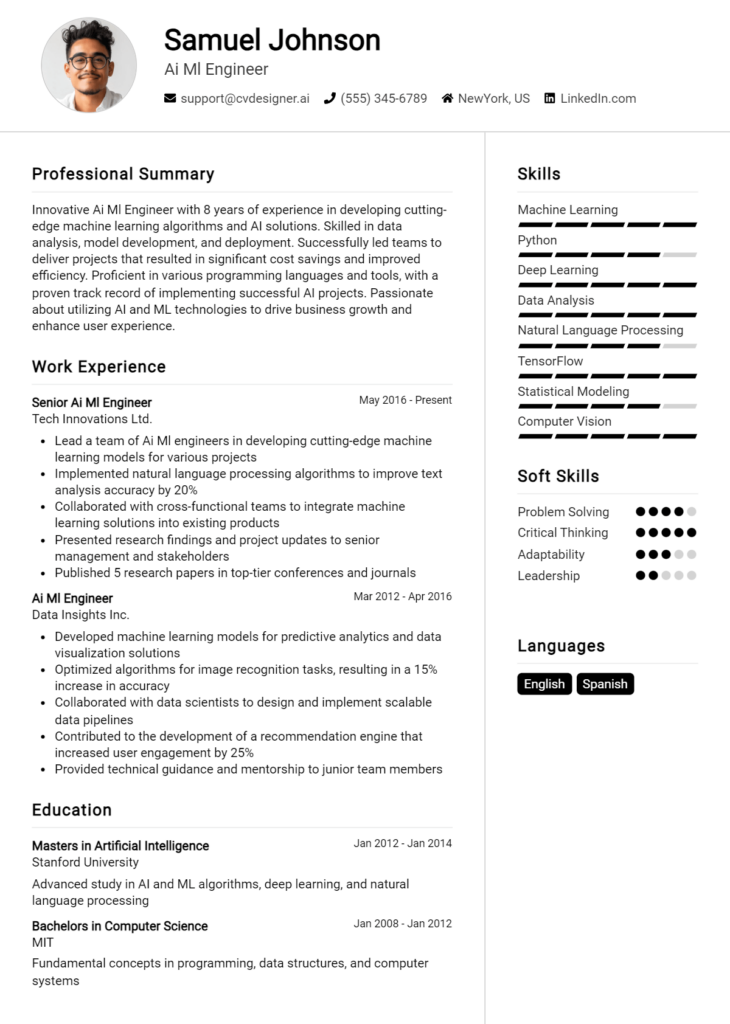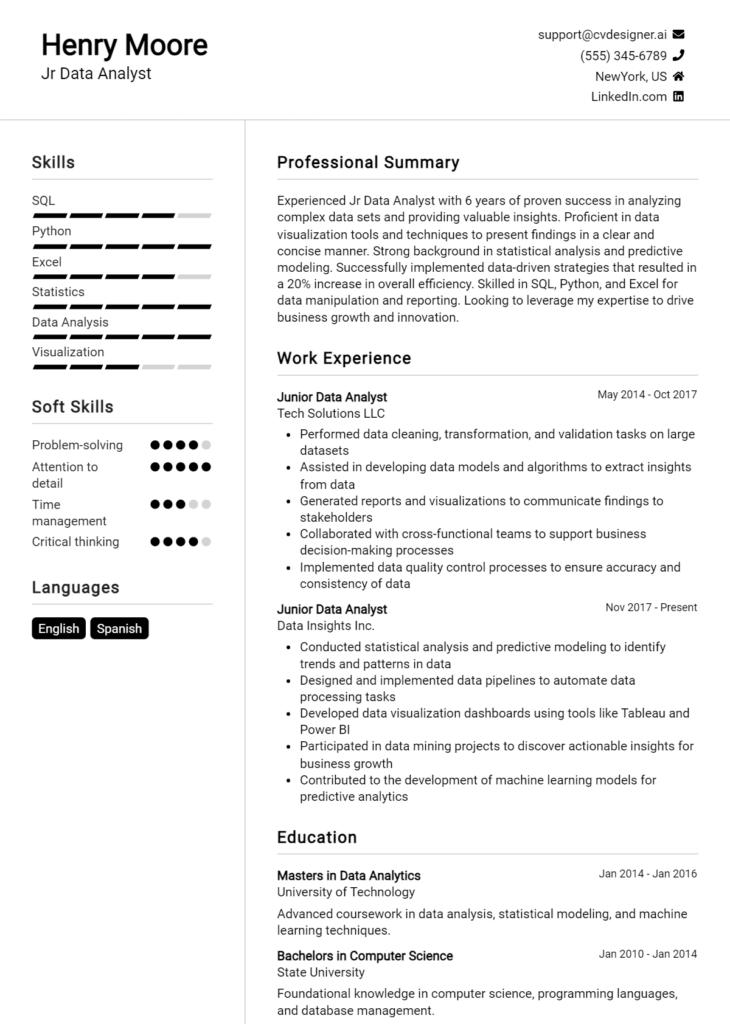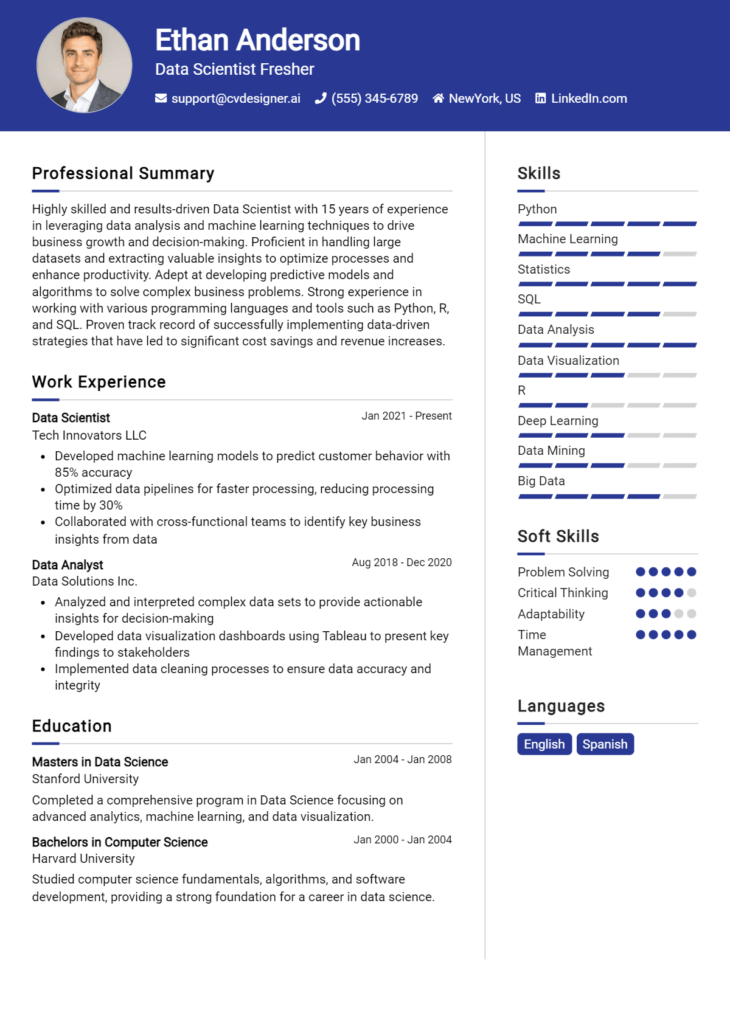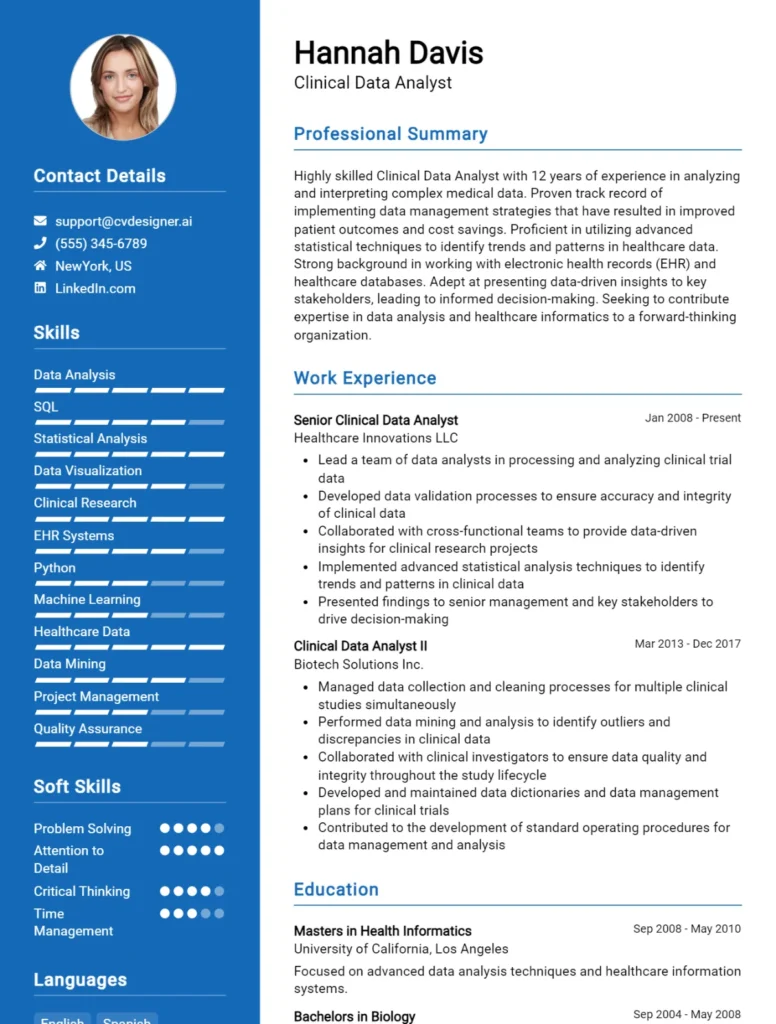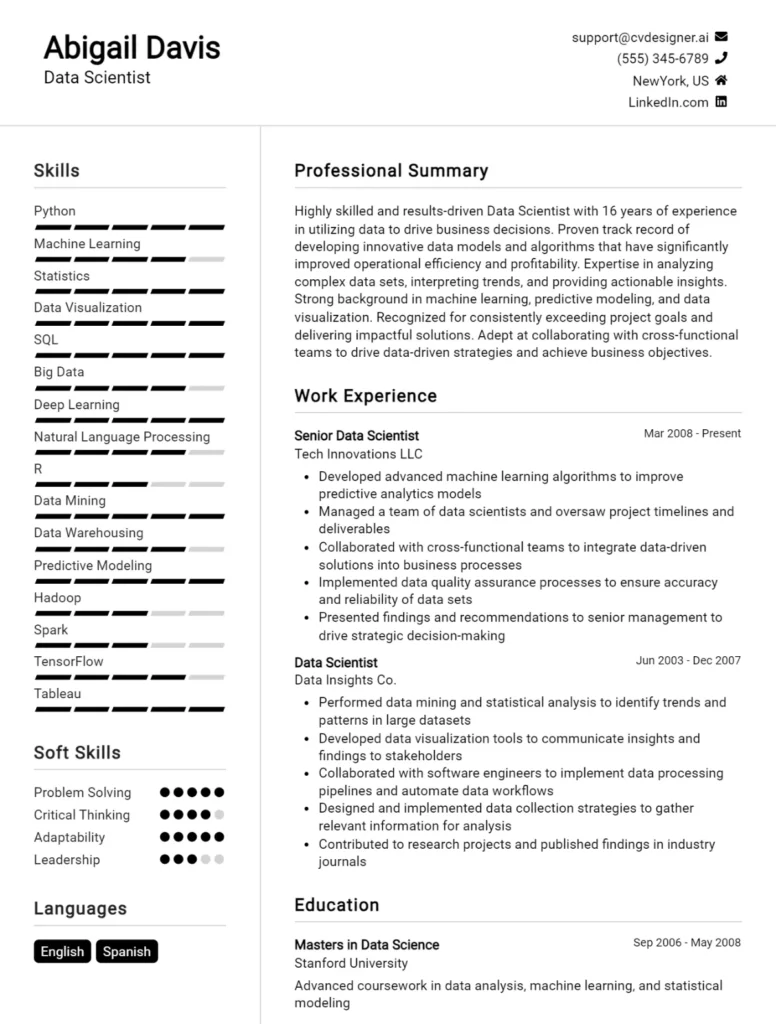Most Popular Artificial Intelligence CV Examples
Explore additional Artificial Intelligence CV samples and guides and see what works for your level of experience or role.
In today's rapidly evolving job market, having a standout CV is essential, especially for roles in the dynamic field of Artificial Intelligence. Whether you're a seasoned professional or just starting your career, crafting a compelling CV can significantly increase your chances of landing an interview. This article will guide you through the essential elements of writing an effective AI CV, showcasing how to highlight your skills, experience, and achievements in a way that resonates with hiring managers. By the end of this guide, you will have a clear understanding of how to present yourself as a strong candidate in the AI domain. Here’s what you can expect to learn:
- Understanding the AI Job Landscape: Insights into the types of roles available and the skills in demand.
- Key Components of an AI CV: Essential sections that every CV should include.
- Tailoring Your CV for Specific Roles: Strategies to customize your CV for different AI positions.
- Showcasing Technical Skills: How to effectively highlight your technical expertise and projects.
- Crafting a Compelling Summary: Tips for writing a captivating personal statement that draws attention.
- CV Formatting Best Practices: Guidelines for creating a clean and professional layout.
- Common Mistakes to Avoid: Pitfalls that can undermine your CV’s effectiveness.
- Example CV for Inspiration: A practical example to guide you in structuring your own CV.
Dive in to transform your CV into a powerful tool that showcases your potential in the world of Artificial Intelligence!
What is a Artificial Intelligence CV?
A Curriculum Vitae (CV) for an artificial intelligence professional serves as a comprehensive document that showcases an individual's qualifications, skills, and experiences within the AI field. It highlights relevant educational backgrounds, technical proficiencies, and project experiences that demonstrate the candidate's capabilities in areas such as machine learning, natural language processing, and data analysis. A well-crafted CV is crucial as it not only summarizes a candidate's journey but also helps them stand out in a competitive job market. To create an impactful CV, it is essential to follow effective strategies; for guidance, you can refer to this cv writing guide.
In addition to detailing qualifications, an AI CV plays a significant role in establishing credibility and professionalism. It allows candidates to present their achievements and contributions to the field, which can include published research, participation in AI competitions, or collaborative projects. An engaging and visually appealing CV can significantly enhance a candidate’s chances of securing interviews, as hiring managers often rely on these documents to make initial assessments. To simplify the process of creating a standout CV, consider using a cv maker that can help you design a professional layout and format tailored to the AI industry.
Key Components of a Artificial Intelligence CV
- Contact Information: Include your name, phone number, email address, and LinkedIn profile or personal website to make it easy for potential employers to reach you.
- Professional Summary: A brief overview of your experience, skills, and career objectives in the field of artificial intelligence, highlighting your unique qualifications.
- Technical Skills: List your core competencies in AI, such as machine learning, deep learning, natural language processing, and programming languages like Python, R, or Java. For more details, visit skills.
- Certifications: Include any relevant certifications, such as those from recognized platforms or institutions, which demonstrate your expertise in AI technologies.
- Education: Detail your academic background, including degrees, institutions, and graduation dates, focusing on relevant fields such as computer science, data science, or AI.
- Work Experience: Outline your professional background, emphasizing roles related to AI. Include company names, job titles, dates, and a description of your responsibilities and achievements. For more information, check work experience.
- Projects: Highlight specific AI projects you have worked on, detailing your contributions, the technologies used, and the impact of the project.
- Publications: If applicable, list any research papers, articles, or contributions to journals that showcase your expertise and thought leadership in AI.
- Awards and Honors: Mention any relevant awards or recognitions you have received for your work in the field of artificial intelligence.
- Professional Affiliations: Include memberships in relevant organizations or groups, such as IEEE, ACM, or specialized AI communities, to demonstrate your commitment to the field.
- Soft Skills: Emphasize interpersonal skills that are crucial in AI roles, such as problem-solving, analytical thinking, teamwork, and communication.
- References: Optionally, state that references are available upon request, or provide contact information for professional references who can vouch for your skills and experience.
Sample Artificial Intelligence CV for Inspiration
[Your Name]
[Your Address]
[City, State, Zip Code]
[Your Phone Number]
[Your Email Address]
[LinkedIn Profile URL]
[GitHub Profile URL]
Professional Summary
Dynamic and results-driven Artificial Intelligence specialist with over 5 years of experience in designing, developing, and deploying machine learning models and AI solutions. Proficient in leveraging advanced algorithms and data analytics to solve complex problems and drive business innovation. Strong background in computer science with extensive knowledge of deep learning, natural language processing, and computer vision. Aiming to contribute technical acumen and innovative strategies to a forward-thinking organization.
Work Experience
Senior AI Engineer
XYZ Tech Solutions, San Francisco, CA
March 2021 – Present
- Led the development of a predictive analytics platform that increased customer retention by 30% through machine learning algorithms.
- Collaborated with cross-functional teams to implement AI-driven solutions, improving operational efficiency by 25%.
- Designed and deployed a natural language processing system that enhanced customer service response accuracy.
- Mentored junior data scientists and AI engineers, fostering a culture of learning and innovation within the team.
AI Research Scientist
ABC Innovations, New York, NY
June 2018 – February 2021
- Conducted groundbreaking research in deep learning, resulting in two publications in prestigious AI journals.
- Developed and optimized neural network architectures for image recognition tasks, achieving a 95% accuracy rate on benchmark datasets.
- Collaborated with product managers to translate research findings into practical applications, leading to the launch of a successful AI-powered mobile app.
- Presented research findings at international conferences, enhancing the organization’s reputation in the AI community.
Data Scientist
Data Insights Corp, Boston, MA
August 2016 – May 2018
- Analyzed large datasets to derive actionable insights using statistical analysis and machine learning techniques.
- Created predictive models that informed marketing strategies, generating a 20% increase in lead conversion rates.
- Developed data visualization tools and dashboards for stakeholders, improving data accessibility and decision-making processes.
- Worked closely with software engineers to integrate machine learning models into production systems.
Education
Master of Science in Artificial Intelligence
Stanford University, Stanford, CA
Graduated: May 2016
Bachelor of Science in Computer Science
University of California, Berkeley, CA
Graduated: May 2014
Skills
- Programming Languages: Python, R, Java, C++
- Machine Learning Frameworks: TensorFlow, PyTorch, scikit-learn
- Natural Language Processing: NLTK, SpaCy, BERT
- Data Analysis and Visualization: Pandas, Matplotlib, Tableau
- Cloud Technologies: AWS, Google Cloud Platform, Azure
- Version Control: Git, GitHub
- Agile Methodologies: Scrum, Kanban
Publications
- Smith, J., & Doe, A. (2020). "Enhancing Neural Networks with Advanced Optimization Techniques." Journal of Artificial Intelligence Research, 45(3), 123-145.
- Smith, J. (2019). "A Comparative Study of Machine Learning Algorithms for Image Classification." International Conference on Machine Learning, 12(1), 67-80.
Certifications
- Certified TensorFlow Developer, TensorFlow Institute, 2021
- Microsoft Certified: Azure AI Engineer Associate, Microsoft, 2020
- IBM Data Science Professional Certificate, IBM, 2019
Artificial Intelligence CV Writing Tips
When crafting a CV for a role in Artificial Intelligence, it's essential to emphasize not only your technical skills but also your ability to apply these skills in real-world scenarios. Start with a strong summary that highlights your experience and passion for AI, then follow with a detailed account of your relevant projects, research, and any tools or programming languages you're proficient in. Tailor your CV to the specific position you're applying for by aligning your skills and experiences with the job description. Make sure to showcase any collaborative projects, as teamwork is often crucial in AI development. Lastly, don't forget to include any certifications or continuous learning endeavors, as the AI field is constantly evolving, and demonstrating a commitment to staying updated can set you apart from other candidates.
- Tailor your CV to the specific AI job description.
- Focus on quantifiable achievements in previous roles (e.g., improved model accuracy by X%).
- Highlight relevant programming languages and tools (e.g., Python, TensorFlow, PyTorch).
- Include any meaningful projects or research, detailing your role and contributions.
- Emphasize soft skills such as problem-solving and teamwork.
- List any certifications or courses related to AI and machine learning.
- Keep the CV concise, ideally 1-2 pages, with clear formatting for easy readability.
- Incorporate keywords from the job posting to pass Applicant Tracking Systems (ATS).
Artificial Intelligence CV Summary Examples
As the field of Artificial Intelligence continues to evolve, crafting a compelling CV summary is essential to stand out to potential employers. A well-written summary can highlight your key skills, experience, and achievements, setting the stage for a successful application. Here are several examples to inspire you:
Results-driven AI specialist with over 5 years of experience in machine learning and data analysis. Proven track record of developing innovative algorithms that improve predictive accuracy by up to 30%. Passionate about leveraging AI to solve complex real-world problems and enhance decision-making processes.
Dynamic AI researcher with a strong background in natural language processing and computer vision. Experienced in deploying AI models in production environments and collaborating with cross-functional teams to drive strategic initiatives. Committed to advancing the field of AI through cutting-edge research and practical applications.
Detail-oriented data scientist with expertise in deep learning and neural networks. Skilled in utilizing Python and TensorFlow to build robust AI solutions that optimize business operations. Adept at communicating technical concepts to non-technical stakeholders, ensuring alignment and understanding across teams.
Innovative machine learning engineer with a focus on developing scalable AI applications. Extensive experience in data preprocessing, model training, and performance evaluation. Known for strong problem-solving skills and a collaborative approach, driving successful project outcomes in fast-paced environments.
Seasoned AI consultant with a decade of experience in transforming business challenges into AI-driven solutions. Proficient in designing and implementing machine learning frameworks that enhance productivity and profitability. Recognized for exceptional analytical skills and the ability to translate complex data into actionable insights.
Build a Strong Experience Section for Your Artificial Intelligence CV
When crafting the experience section of your Artificial Intelligence CV, it's crucial to highlight not only your technical skills but also the tangible impact of your work. The following examples showcase diverse roles and responsibilities that demonstrate proficiency in AI, machine learning, and data analysis, reflecting both the complexity of the projects and the outcomes achieved.
- Developed and implemented machine learning models for predictive analytics, resulting in a 30% increase in forecast accuracy for sales data, significantly improving inventory management processes.
- Collaborated with a cross-functional team to design a natural language processing (NLP) solution that enhanced customer support chatbots, reducing average response time by 50% and improving user satisfaction scores by 20%.
- Led the deployment of a computer vision system for quality control in a manufacturing environment, decreasing defect rates by 15% and reducing costs associated with rework and returns.
- Conducted extensive data analysis and feature engineering to optimize algorithm performance, which improved model training time by 40%, enabling quicker iterations and faster deployment cycles.
- Spearheaded a project utilizing reinforcement learning techniques to optimize supply chain logistics, resulting in a 25% reduction in shipping costs and a 10% improvement in delivery times.
- Designed and executed A/B testing strategies for AI-driven marketing campaigns, which led to a 35% increase in conversion rates and provided actionable insights for future campaigns.
- Authored and published research papers on advancements in deep learning algorithms, contributing to the academic community and enhancing the organization's reputation in the AI field.
- Managed a team of data scientists and engineers in the development of an AI-based recommendation system, which increased user engagement by 45% and drove a significant uplift in revenue for the company.
Artificial Intelligence CV Education Examples
Artificial Intelligence (AI) is a rapidly evolving field that requires a solid educational foundation in various disciplines. Professionals pursuing a career in AI often have backgrounds in computer science, mathematics, engineering, and related fields. Here are some examples of educational qualifications that are highly relevant to a career in Artificial Intelligence:
- Bachelor's Degree in Computer Science: This program typically covers programming, algorithms, data structures, and software development, providing a strong base for understanding AI technologies.
- Master's Degree in Artificial Intelligence: A specialized program focusing on machine learning, neural networks, natural language processing, and robotics, equipping students with advanced knowledge and skills.
- Ph.D. in Machine Learning: This research-focused degree emphasizes deep learning, statistical models, and the theoretical foundations of machine learning, preparing graduates for academic and high-level industry roles.
- Bachelor's Degree in Mathematics: A solid grounding in calculus, linear algebra, probability, and statistics, essential for understanding the mathematical principles underlying AI algorithms.
- Master's Degree in Data Science: This interdisciplinary program combines computer science, statistics, and domain-specific knowledge, focusing on data analysis and machine learning, which are crucial in AI applications.
Skills to Highlight in Your Artificial Intelligence CV
In the rapidly evolving field of Artificial Intelligence, showcasing a well-rounded skill set is crucial for standing out to potential employers. A successful AI professional not only possesses strong technical abilities but also demonstrates essential soft skills that facilitate collaboration and innovation. Below is a comprehensive list of key skills to highlight in your AI CV, ensuring you present a balanced profile that appeals to recruiters.
Soft Skills:
- Problem-solving: Ability to analyze complex issues and develop effective solutions.
- Critical thinking: Evaluating information and arguments to make informed decisions.
- Communication: Clearly conveying technical concepts to non-technical stakeholders.
- Teamwork: Collaborating effectively with diverse teams to achieve common goals.
- Adaptability: Adjusting to new technologies and methodologies in a fast-paced environment.
- Creativity: Thinking outside the box to generate novel AI solutions.
- Time management: Prioritizing tasks and managing time efficiently to meet deadlines.
- Emotional intelligence: Understanding and managing one's emotions and those of others.
- Attention to detail: Ensuring high accuracy and quality in data and algorithm development.
- Leadership: Guiding and motivating teams towards achieving project objectives.
Hard Skills:
- Machine Learning: Proficiency in algorithms and techniques for predictive modeling.
- Deep Learning: Experience with neural networks and frameworks like TensorFlow or PyTorch.
- Natural Language Processing: Knowledge of techniques for processing and analyzing human language.
- Data Analysis: Ability to manipulate and analyze large datasets using tools like Python or R.
- Programming Languages: Proficiency in languages such as Python, Java, or C++.
- Data Visualization: Skills in visualizing data using tools like Tableau or Matplotlib.
- Statistical Analysis: Understanding of statistical methods and their applications in AI.
- Cloud Computing: Familiarity with cloud platforms like AWS, Google Cloud, or Azure for deploying AI solutions.
- Robotics: Knowledge of robotic process automation and its integration with AI.
- Ethics in AI: Understanding the ethical implications and societal impact of AI technologies.
Artificial Intelligence CV Format
When crafting a CV for a role in Artificial Intelligence, it's essential to tailor the format to reflect your experience and expertise. Different job levels demand varying degrees of detail and focus in your CV. For entry-level positions, a straightforward chronological format works best, while mid-level roles may benefit from a hybrid format that highlights both skills and experience. Senior roles often require a more strategic format, showcasing leadership and project outcomes.
- Entry-Level: Use a chronological format emphasizing education, internships, and relevant coursework.
- Mid-Level: Adopt a hybrid format that balances skills and work experience, highlighting specific AI projects and achievements.
- Senior-Level: Implement a strategic format that showcases leadership roles, successful project management, and contributions to AI innovation.
- Technical Positions: Focus on skills and technical proficiencies, using a skills-based format to detail programming languages and AI tools.
- Research Roles: Highlight publications and research contributions prominently in a chronological format to emphasize academic credentials.
- Tailor Content: Ensure that each CV is tailored specifically to the job description, using industry-specific keywords and metrics.
For further insights into CV formats, check out this cv format guide.
Common Mistakes to Avoid in a Artificial Intelligence CV
When crafting a CV for a role in artificial intelligence, it's crucial to present your skills, experience, and knowledge in a way that stands out to potential employers. However, there are several common pitfalls that candidates often fall into, which can diminish the effectiveness of their applications. Avoiding these mistakes will help ensure that your CV accurately reflects your qualifications and makes a positive impression.
- Neglecting to Highlight Relevant Skills: Failing to clearly outline AI-specific skills such as machine learning algorithms, programming languages (Python, R), and frameworks (TensorFlow, PyTorch) can make your CV less compelling.
- Using Generic Job Descriptions: Copying and pasting job descriptions without tailoring them to reflect your actual responsibilities and achievements in previous roles can come off as unoriginal.
- Ignoring the Importance of Projects: Not including personal or academic projects that demonstrate your practical experience in AI can be a missed opportunity to showcase your hands-on skills.
- Overloading with Technical Jargon: While it's important to demonstrate technical proficiency, overloading your CV with jargon can alienate non-technical recruiters or hiring managers.
- Lack of Quantifiable Achievements: Omitting specific metrics or results from your past work can lead to a vague portrayal of your contributions. Always aim to quantify your impact (e.g., "improved model accuracy by 15%").
- Inconsistent Formatting: A CV that lacks a cohesive format can be difficult to read. Ensure that font sizes, bullet points, and headings are consistent throughout.
- Failing to Tailor for the Job: Sending the same CV for multiple applications without tailoring it to the specific role can make it appear that you are not genuinely interested in the position.
- Ignoring Soft Skills: While technical skills are essential, overlooking soft skills such as teamwork, communication, and problem-solving can give an incomplete picture of your capabilities.
- Not Including Continuous Learning: In the rapidly evolving field of AI, neglecting to mention ongoing education or certifications can make it seem like you are not keeping up with industry trends.
- Skipping a Professional Summary: Omitting a brief professional summary at the beginning of your CV can lead to a lack of direction and focus. A summary can help contextualize your experience and goals for the reader.
Key Takeaways for a Artificial Intelligence CV
- Tailored Summary: Start with a concise summary that highlights your expertise in artificial intelligence, showcasing your relevant skills and experiences.
- Technical Skills: List key technical skills such as machine learning, natural language processing, deep learning, and programming languages (Python, R, etc.) that are essential for AI roles.
- Education: Include your highest degrees related to AI or computer science, emphasizing any specialized coursework or projects that demonstrate your knowledge.
- Relevant Experience: Detail your work experience in AI, focusing on your roles, responsibilities, and the impact of your contributions on previous projects.
- Projects and Achievements: Highlight specific AI projects you've worked on, including any algorithms developed, research conducted, or innovations introduced.
- Certifications: Mention any relevant certifications (e.g., TensorFlow Developer, AWS Certified Machine Learning) that validate your skills and expertise in AI.
- Publications and Conferences: If applicable, include any research papers published or conferences attended, showcasing your engagement with the AI community.
- Soft Skills: Note important soft skills such as problem-solving, teamwork, and communication, which are crucial for collaboration in AI projects.
- Continuous Learning: Emphasize your commitment to continuous learning through online courses, workshops, or AI-related competitions.
- Professional Affiliations: List memberships in professional organizations related to AI or tech, illustrating your dedication to the field.
- Portfolio Link: Provide a link to your online portfolio or GitHub, where potential employers can view your work and projects in detail.
- Custom CV Design: Consider using cv templates to create a visually appealing CV, and utilize a cv builder for an easy and professional layout. Don’t forget to complement your CV with a well-crafted cover letter templates that highlights your passion for AI.
Build your CV in minutes
Use an AI-powered cv builder and have your cv done in 5 minutes. Just select your template and our software will guide you through the process.
